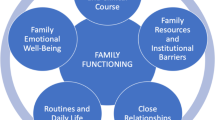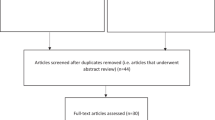Abstract
This exploratory study investigates perceived levels of family stress for military families who have a young child with a disability. Two primary areas of study were the sources and levels of stress, and the benefits of resources designed to help families cope. Results of the study indicate an increased level of stress for families when the demands of military life were coupled with the demands of caring for a young child with a disability. Events such as separation from family members, relocation, deployment, and personal safety and health issues emerged as concerns of the military personnel. The importance of coordinating services for these families is discussed.
Similar content being viewed by others
REFERENCES
Black, W. G. (1993). Military-induced family separation: A stress reduction intervention. Social Work, 38, 273–280.
Bowen, G. L., Orthner, D. K., & Zimmerman, L. I. (1993). Family adaptation of single parents in the United States army: An empirical analysis of work stressors and adaptive resources. Family Relations, 42, 293–304.
Boyce, G. C., & Barnett, W. S. (1991). Parenting children with Down syndrome: Do your activities and attitudes differ from parents of children without Down syndrome? Paper presented at the 19th annual convention of the National Down Syndrome Congress, Boston.
Defense Manpower Data Center. (1985). Description of spouses of officers and enlisted personnel in the U.S. armed forces: 1985. Arlington, VA: Author. As cited in Black, W. G. (1993). Military-induced family separation: A stress reduction intervention. Social Work, 38, 273–280.
Dyson, L. L. (1993). Response to the presence of a child with disabilities: Parental stress and family functioning over time. American Journal on Mental Retardation, 98, 207–218.
Dyson, L. L. (1996). The experiences of families of children with learning disabilities: Parental stress, family functioning, and sibling self-concept. Journal of Learning Disabilities, 29, 280–286.
Garrett, G. R., Parker, B., Day, S., Van Meter, J. J., & Cosby, W. (1978). Drinking with the military wife: A study of married women in overseas base communities. In E. J. Hunter & D. S. Nice (Eds.), Military families: Adaptation to change (pp. 222–237). New York: Praeger. As cited in Black, W. G. (1993). Military-induced family separation: a stress reduction intervention. Social Work, 38, 273–280.
Hanson, M. J., & Hanline, M. F. (1990). Parenting a child with a disability: A longitudinal study of parental stress and adaptation. Journal of Early Intervention, 14, 234–248.
Hill, R. (1949). Families under stress. New York: Harper & Row.
Innocenti, M. S., Huh, K., & Boyce, G. C. (1992). Families of children with disabilities: Normative data and other considerations on parenting stress. Topics in Early Childhood Special Education, 12, 403–427.
Levine, A. M., & Dougherty, L. M. (1997). The health and nutrition of children in military families. (MFI Technical Report 97–2. DTIC ADA 329359). Scranton, PA: Military Family Institute, Marywood University.
Lonner, T., Hempleman, B., & Longhi, D. (1994). Exploratory study of barriers in birth to three services: Children with disabilities and special health care needs in Washington State Public Programs. Olympia, WA: Technical Report from the Office of Research and Data Analysis.
McCallion, P., & Toseland, R. W. (1993). Empowering families of adolescents and adults with developmental disabilities. Families in Society: The Journal of Contemporary Human Services, 74, 579–587.
McCubbin, H. I., Joy, C. B., Cauble, A. E., Comeau, J. K., Patterson, J. M., & Needle, R. H. (1981). Family stress, coping and social support: A decade review. Journal of Marriage and the Family, 43, 855–871.
McCubbin, H. L., & Dahl, B. B. (1976). Prolonged family separation: A longitudinal study. In H. I. McCubbin, B. B. Dahl, & E. J. Hunter (Eds.), Families in the military system (pp. 291–319). Beverly Hills, CA: Sage.
McCubbin, H. L., & Patterson, J. M. (1983). The family stress process: The Double ABCX Model of adjustment and adaptation. In H. McCubbin, M. Sussman, & J. Patterson (Eds.), Social stress and the family: Advances and developments in family stress theory and research (pp. 7–37). New York: Haworth.
McCubbin, M. A., & McCubbin, H. I. (1987). Family stress theory and assessment: The T-Double ABCX Model of family adjustment and adaptation. In H. I. McCubbin & A. I. Thompson (Eds.), Family assessment inventories for research and practice (pp. 3–32). Madison: University of Wisconsin–Madison.
Murphy, D. L., Behr, S. K., & Summers, J. A. (1990). Do something about it·think! Cognitive coping strategies and stress and wellbeing in parents of children with disabilities. Paper presented at the annual meeting of the American Psychological Association: Boston.
Paulus, P. B., Nagar, D., Larey, T. S., & Camacho, L. M. (1996). Environmental, lifestyle, and psychological factors in the health and well-being of military families. Journal of Applied Social Psychology, 26, 2053–2075.
Rousey, A., Best, S., & Blacher, J. (1992). Mothers' and fathers' perceptions of stress and coping with children who have severe disabilities. American Journal on Mental Retardation, 97, 99–09.
Ryan, B. A. (1995). The family-school connection: Theory, research, and practice. Issues in children's and families' lives (Vol. 2. p. 317). The John & Kelly Hartman Series. Thousand Oaks, CA: Sage.
Segal, M. W. (1989). The nature of work and family linkages: A theoretical perspective. In G. L. Bowen & D. K. Orthner (Eds.), The organizational family: Work and family linkages in the U.S. military (pp. 3–36). New York: Praeger.
Segal, M. W., & Harris, J. J. (1993). What we know about Army families. Alexandria, VA: U.S. Army Research Institute for the Behavioral and Social Sciences.
Sexton, D., Burrell, B., Thompson, B., & Sharpton, W. R. (1992). Measuring stress in families of children with disabilities. Early Education and Development, 3, 60–66.
Author information
Authors and Affiliations
Rights and permissions
About this article
Cite this article
Russo, T.J., Fallon, M.A. Helping Military Families Who Have a Child with a Disability Cope with Stress. Early Childhood Education Journal 29, 3–8 (2001). https://doi.org/10.1023/A:1011348620920
Issue Date:
DOI: https://doi.org/10.1023/A:1011348620920




